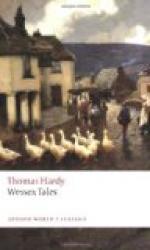The elegant new residence was sold with the rest of his possessions; and its purchaser was no other than Downe, now a thriving man in the borough, and one whose growing family and new wife required more roomy accommodation than was afforded by the little house up the narrow side street. Barnet’s old habitation was bought by the trustees of the Congregational Baptist body in that town, who pulled down the time-honoured dwelling and built a new chapel on its site. By the time the last hour of that, to Barnet, eventful year had chimed, every vestige of him had disappeared from the precincts of his native place, and the name became extinct in the borough of Port-Bredy, after having been a living force therein for more than two hundred years.
CHAPTER IX
Twenty-one years and six months do not pass without setting a mark even upon durable stone and triple brass; upon humanity such a period works nothing less than transformation. In Barnet’s old birthplace vivacious young children with bones like india-rubber had grown up to be stable men and women, men and women had dried in the skin, stiffened, withered, and sunk into decrepitude; while selections from every class had been consigned to the outlying cemetery. Of inorganic differences the greatest was that a railway had invaded the town, tying it on to a main line at a junction a dozen miles off. Barnet’s house on the harbour-road, once so insistently new, had acquired a respectable mellowness, with ivy, Virginia creepers, lichens, damp patches, and even constitutional infirmities of its own like its elder fellows. Its architecture, once so very improved and modern, had already become stale in style, without having reached the dignity of being old-fashioned. Trees about the harbour-road had increased in circumference or disappeared under the saw; while the church had had such a tremendous practical joke played upon it by some facetious restorer or other as to be scarce recognizable by its dearest old friends.
During this long interval George Barnet had never once been seen or heard of in the town of his fathers.
It was the evening of a market-day, and some half-dozen middle-aged farmers and dairymen were lounging round the bar of the Black-Bull Hotel, occasionally dropping a remark to each other, and less frequently to the two barmaids who stood within the pewter-topped counter in a perfunctory attitude of attention, these latter sighing and making a private observation to one another at odd intervals, on more interesting experiences than the present.
‘Days get shorter,’ said one of the dairymen, as he looked towards the street, and noticed that the lamp-lighter was passing by.
The farmers merely acknowledged by their countenances the propriety of this remark, and finding that nobody else spoke, one of the barmaids said ‘yes,’ in a tone of painful duty.
‘Come fair-day we shall have to light up before we start for home-along.’




